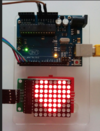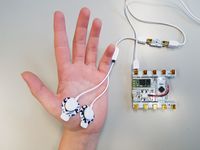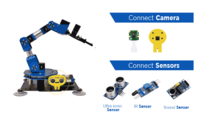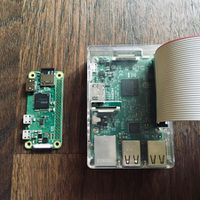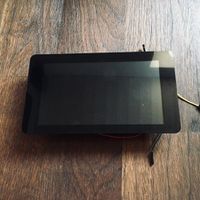Difference between revisions of "My wiki:JW, YS"
| Line 26: | Line 26: | ||
<tr bgcolor="#ffffff"> | <tr bgcolor="#ffffff"> | ||
<td>EDA (electrodermal activity)<br/> | <td>EDA (electrodermal activity)<br/> | ||
| − | [[File:Bitalino photo.jpg|200px|thumb| | + | [[File:Bitalino photo.jpg|200px|thumb|center|src: https://iml.dfki.de/cognitive-load-measurement-using-electrodermal-activity/]] |
</td> | </td> | ||
<td>Measure electrodermal activity</td> | <td>Measure electrodermal activity</td> | ||
| Line 32: | Line 32: | ||
<tr bgcolor="#ffffff"> | <tr bgcolor="#ffffff"> | ||
<td>Robotic arm<br/> | <td>Robotic arm<br/> | ||
| − | [[File:RoboticArm.png|200px|thumb| | + | [[File:RoboticArm.png|200px|thumb|center|src: https://shop.sb-components.co.uk/products/piarm-the-diy-robotic-arm-for-raspberry-pi]] |
</td> | </td> | ||
<td>Actively take away cellphones and detect cellphones with IR distance sensor</td> | <td>Actively take away cellphones and detect cellphones with IR distance sensor</td> | ||
| Line 38: | Line 38: | ||
<tr bgcolor="#ffffff"> | <tr bgcolor="#ffffff"> | ||
<td>Pi zero/Pi3<br/> | <td>Pi zero/Pi3<br/> | ||
| − | [[File:Pi.jpg|200px]] | + | [[File:Pi.jpg|200px|center]]</td> |
| − | </td> | ||
<td>Data center</td> | <td>Data center</td> | ||
</tr> | </tr> | ||
<tr bgcolor="#ffffff"> | <tr bgcolor="#ffffff"> | ||
<td>P3 touchscreen<br/> | <td>P3 touchscreen<br/> | ||
| − | [[File:Touch.jpg|200px]]</td> | + | [[File:Touch.jpg|200px|center]]</td> |
<td>Dashboard, display sensor data and other relevant information (nice to have)</td> | <td>Dashboard, display sensor data and other relevant information (nice to have)</td> | ||
</tr> | </tr> | ||
<tr bgcolor="#ffffff"> | <tr bgcolor="#ffffff"> | ||
<td>LED matrix<br/> | <td>LED matrix<br/> | ||
| − | [[File:Heart.png|100px | + | [[File:Heart.png|100px|center]]</td> |
<td>Visualize time duration</td> | <td>Visualize time duration</td> | ||
</tr> | </tr> | ||
Revision as of 14:06, 4 December 2020
Contents
System Description
“Digital stress cleaner” is a system that is designed for disengagement of digital consumption. Due to the “attention economy”, digital products like “Tik Tok”, “Instagram” are designed to make users addicted to it and therefore users did not do productive work, which causes anxiety.
During study hours, this system will monitor user’s anxiety by using EDA (electrodermal activity). If the EDA shows the user is under stress, the system will give the user a signal which is sent by robotic arm(swing back and forth) This signal is a kindly reminder that the user is playing with the smartphone for too long and should hand in the smartphone to the designated area. The robotic arm which is mounted on the table, will then detect the smartphone by using IR distance sensor. If the user has put it to the designated area, the robotic arm will clamp it and put it into the container which will detect if the smartphone is within it by using pressure sensor. Then comes the gamification part: the LED matrix display will begin to draw one random point every two minutes. After the user has successfully concentrated on his/her work for a long time, the whole pattern will be shown, which will be different every time.
Annotation:
- The user’s mental state is normal by default. We assume stress is caused by compulsory checking of smartphone/ unstoppable consuming short videos, procrastination and so on.
- Users can set up when the study hour is. Before study hours begins, the user will turn on the robot arm, put on EDA devices and other preparation.
- This system does not require users to hand in their phones at the beginning or do not allow users to touch their phones like other time management applications, because users may need their phones when they encounter problems. It works like a monitor and only takes action when necessary.
- The container is equipped beside the table where it is not that easy reachable for users. But it is not far away for robotic arm.
- The gamification part is a reward. It works like other applications where trees can be planted. It is also an embodiment of the refreshed mental state.
System Architecture
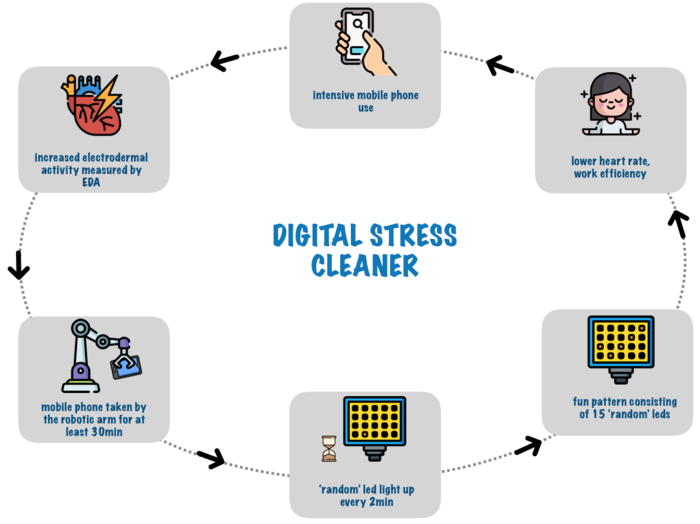
| Technology/materials | Purpose |
|---|---|
| EDA (electrodermal activity) |
Measure electrodermal activity |
| Robotic arm |
Actively take away cellphones and detect cellphones with IR distance sensor |
| Pi zero/Pi3 |
Data center |
| P3 touchscreen |
Dashboard, display sensor data and other relevant information (nice to have) |
| LED matrix |
Visualize time duration |
Required Hardware
- BITalino Electrodermal Activity (EDA)
https://www.exp-tech.de/sensoren/biometrisch/6621/bitalino-electrodermal-activity-eda - ECG-GEL-ELECTRODE
https://www.exp-tech.de/zubehoer/sonstige/5587/ecg-gel-electrode - 2-Lead Electrode Cable
https://plux.info/cables/227-2-lead-electrode-cable.html (did not find it in the listed shop) (optional: this Kit: https://www.exp-tech.de/plattformen/kits/6618/bitalino-heartbit-kit then with this Kit we do not need the other EDA equipments (the first two) anymore because it contains others and is expensive) - Metal Robot-Arm Kit
https://www.reichelt.de/metall-roboter-arm-kit-fuer-raspberry-pi-4-dof-rpi-robot-arm-p266037.html?CCOUNTRY=445&LANGUAGE=de&trstct=pos_0&nbc=1&&r=1 - IR Distance sensor
https://www.reichelt.de/infrarot-abstandssensor-gp2y0a21yk0f-rbt-sen-ir01-p258659.html?&trstct=pos_2&nbc=1 - Ultra sound distance sensor
https://www.reichelt.de/entwicklerboards-ultraschall-abstandssensor-hc-sr04-debo-sen-ultra-p161487.html?&nbc=1&trstct=lsbght_sldr::284398 - Pressure sensor
https://www.reichelt.de/de/de/arduino-drucksensor-20-g-bis-10-kg-ard-sen-pressure-p284398.html?trstct=pos_0&nbc=1&&r=1 - Led matrix
https://www.conrad.de/de/p/wemos-8x8-matrix-led-shield-v1-0-0-fuer-d1-802231563.html#productDescription
Relation to Digital Health
“Instead of improving our lives, technology is increasingly getting in the way of enjoying our lives. And the biggest source of trouble is that device that's with you wherever you go.” We can confidently but not really proudly admit that we, people who are stuck in the modern society, have a problem with digital devices, especially with the cellphones. This problem is known as smartphone addiction, smartphone overuse or cellphone dependency. The problematic use of cellphones comprehends “preoccupation with mobile communication, excessive money or time spent on mobile phones, and use of mobile phones in socially or physically inappropriate situations”. Pardon the bluntness, but we are mostly, if not all, phone junkies.
While being a phone junkie at home harms none, being one at work may cost quite a bit. Facing this issue, our ultimate vision is to “rescue” people from their addiction at the workplace. “Digital Stress Cleaner” (DSC) is the first baby step towards this goal. DSC helps users get used to a low proximity to their cellphones. Daily enforcement along with the small treat (gradually formed LED pattern) will eventually replace users’ old unhealthy habit of cellphone overuse with a new one, which is associated with an intrinsic disengagement of cellphones, higher working efficiency and a better, calmer mental state.
Evaluation
- User test / survey
- Is user’s stress reduced?
- Electrodermal activity comparison
- Screen time report
- ...
References
- https://theweek.com/articles/688639/5-sciencebacked-ways-break-phone-addiction
- https://en.wikipedia.org/wiki/Problematic_smartphone_use
- https://howtomechatronics.com/tutorials/arduino/diy-arduino-robot-arm-with-smartphone-control
- https://iml.dfki.de/cognitive-load-measurement-using-electrodermal-activity/
- https://www.waveshare.com/wiki/Robot_Arm_for_Pi
